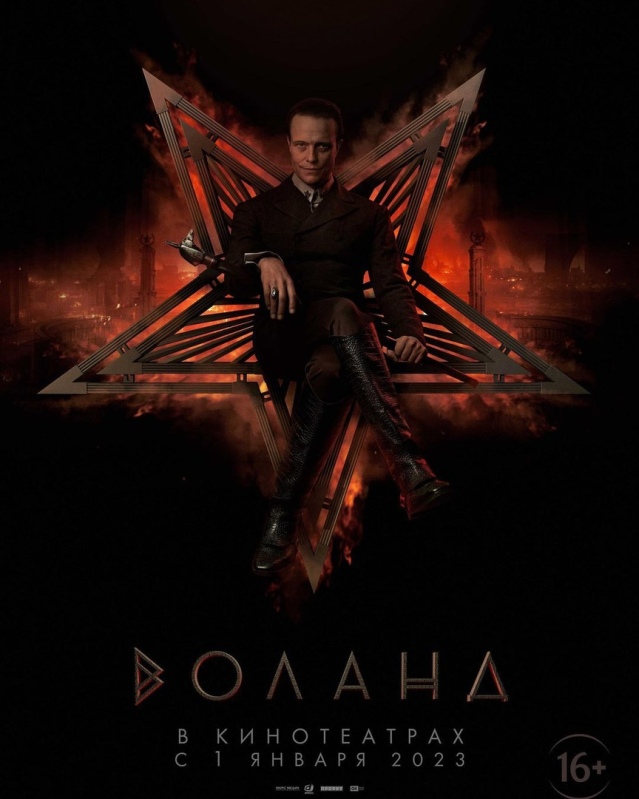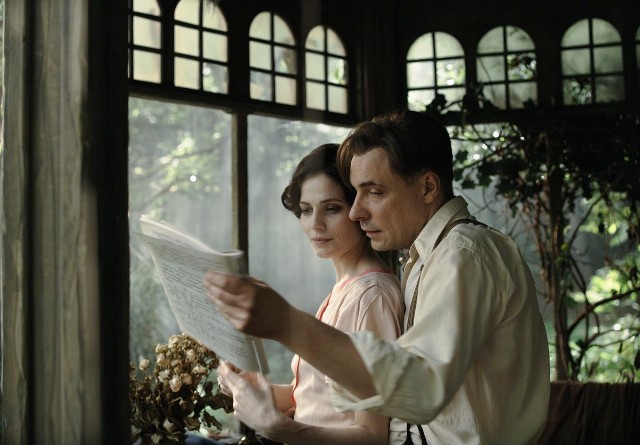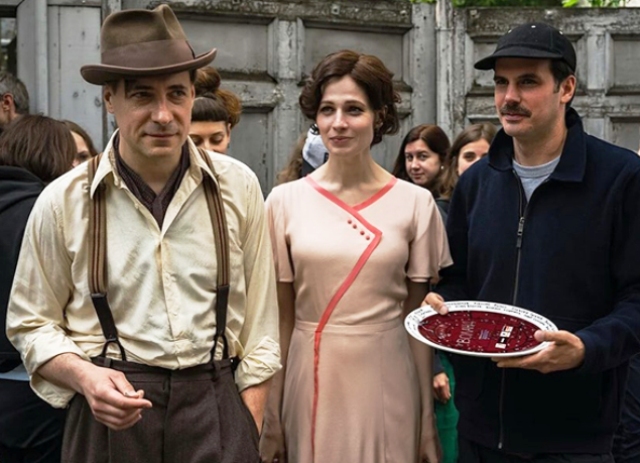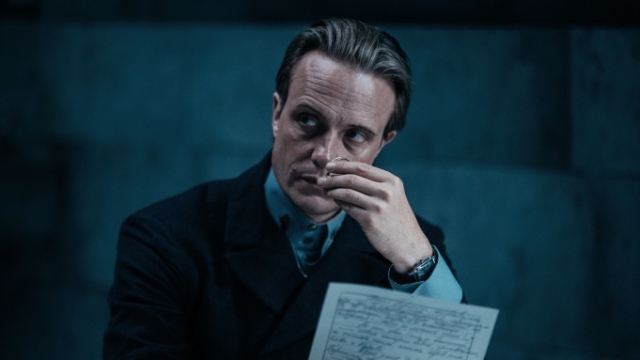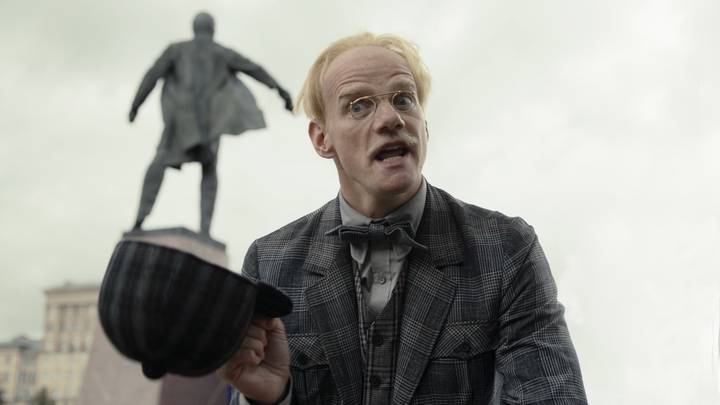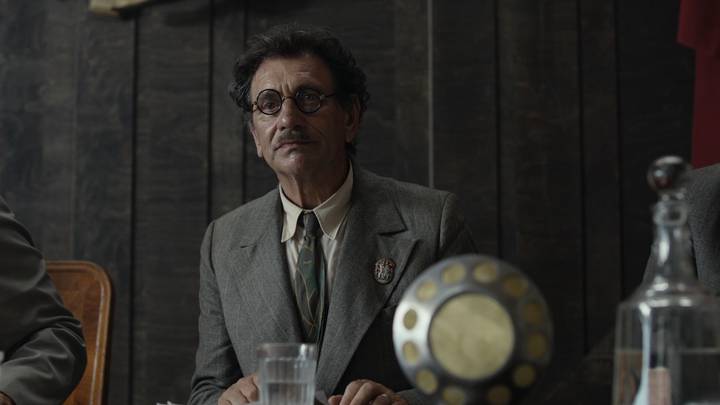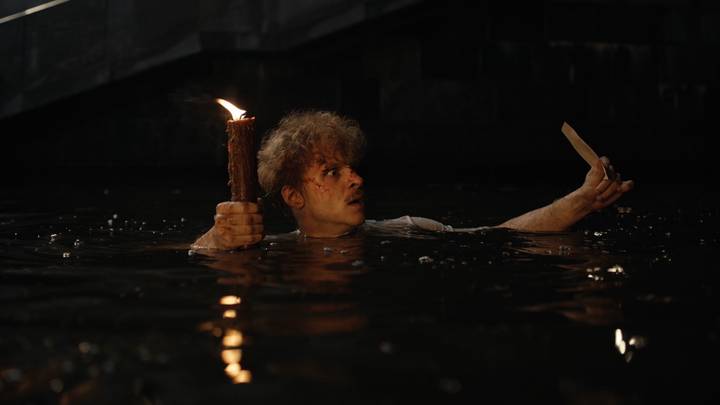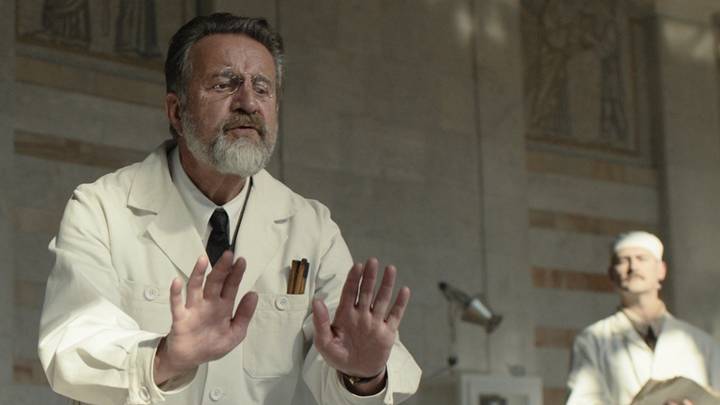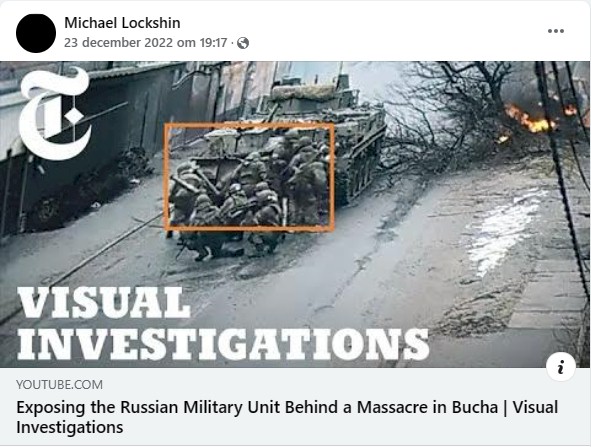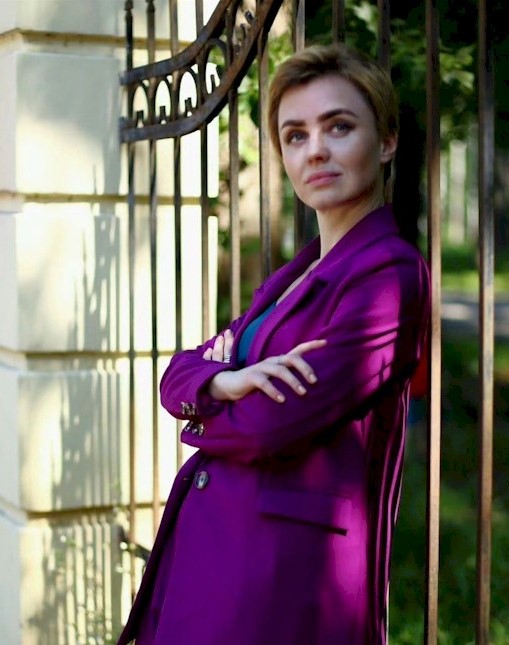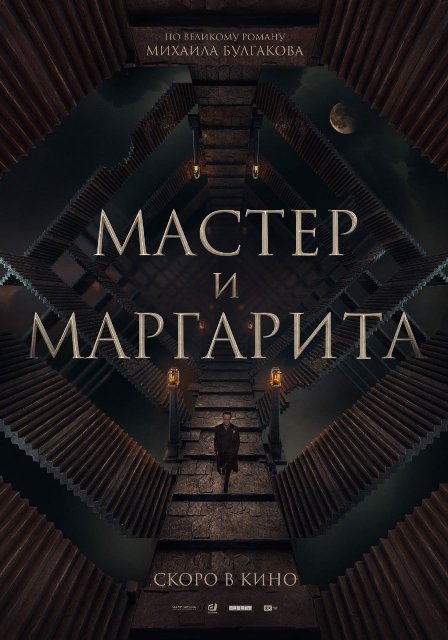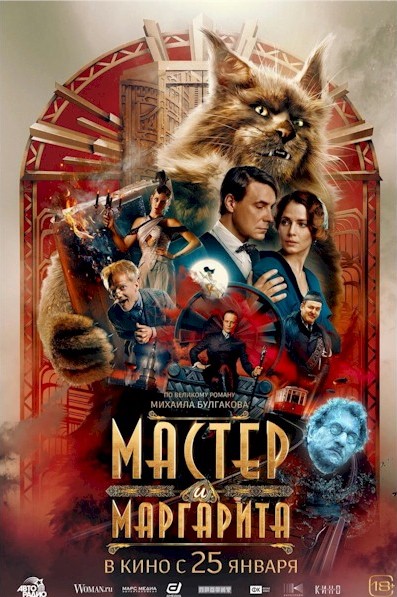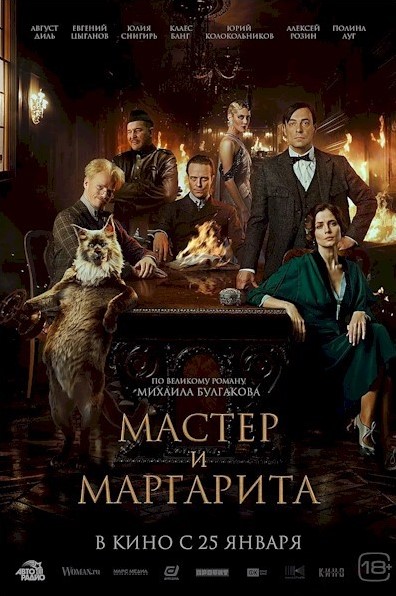Мастер и Маргарита - Михаил Локшин
Русский > Адаптация > Фильмы > Художественные фильмы > Михаил Локшин
Мы продолжаем напряженно работать, чтобы улучшить наш сайт и перевести его на другие языки. Русская версия этой страницы еще не совсем готова. Поэтому мы представляем здесь пока английскую версию. Мы благодарим вас за понимание.
On January 25, 2024, the film The Master and Margarita directed by Michael Lockshin premiered in the Russian cinema theatres. This film has undergone an eventful development since the start of the project in 2018, of which you can read more about by clicking the link below.
Click here to read the history of this film
The film
The regular visitors to this website know that the novel The Master and Margarita by Mikhail Bulgakov has three storylines: the biblical story, the story of the devil in Moscow, and the love story of the master and Margarita. In this film a fourth storyline is added. That fourth storyline tells how a writer, who is called the master, writes a novel about himself, about his beloved Margarita and about the people around them who influence their lives. The title of that novel is - you might have guessed it - The Master and Margarita.
Would you find this a bit confusing? Don't worry, the screenwriters of this film were apparently sometimes quite confused themselves with this extra dimension. Where Bulgakov in his novel initially runs the three storylines in parallel in a clear manner and make them come together flawlessly at the end, in this film there is quite a muddle. During the film's 2 hours and 31 minutes, the events are jumping quickly and chaotically from one storyline to another, without dramatic connections or logical leads, and in an often incomprehensible chronology.
The storyline
Anyway, let's try to describe the course of the film as best as possible. The opening scene is the scene in which Margarita destroys the apartment of the critic Latunsky in the Dramlit House or, to put it another way, a scene from Chapter 21 of the novel. After that, we see a successful playwright called the master who is going to a theatre in Moscow to attend a rehearsal of his play Pilate. At the entrance to the theatre it becomes clear how popular he is: there are women waiting to ask for his autograph - a reference to the time when Bulgakov's play Days of the Turbins was performed 987 times with great success at the Moscow Art Theater. This staging is very similar to the opening scene of the 1972 film Il maestro e Margherita by the Serbian director Aleksandar Petrović. One of the women who approach the master is the red-haired Gala is the red-haired Gala, with whom the master agrees to go to the Griboedov writers' house later that day, where they will meet his friend Aloisy Mogarych.
But first the master has to go to the Writers' Union to answer questions about his play Pilate in a public trial. The State censors want to have it removed from the stage under the motto:«what is allowed today may be prohibited tomorrow». This meeting is also reminiscent of Aleksandar Petrović's film from 1972. During the hearing, allegations are formulated by the critic Latunsky and Baron Meigel, while the poet Bezdomny entertains the public with his poetic improvisations.
Later that evening, when he is in Griboedov with Gala and Mogarych, the master learns that he has got quite some sympathy among the Moscow writers, even to the extent that they are prepared to demonstrate the next day in the streets of Moscow against the censoring of writers - not caring about the large May Day parade of the communist party which is also planned through the streets of Moscow for that same day. When the master notices that the critic Latunsky is also entering the Writers' House, he wants to talk to him, but he is stopped by the retaurant manager. He is forced to hand in his membership card of the Writers' Union and to leave the Writers' Houseintantly. Outside the building he meets a German proessor called Woland, to whom he briefly tells his story. When Woland leaves in a taxi, the master notices that Gala is also getting into Woland's car.
The next morning, only two people show up at the Writers' House to protest against the censorship: the master and Mogarych. But a little further on, a large crowd has gathered for the May Day parade. Among the thousands of participants and spectators, there are many women carrying bouquets of yellow flowers. One of these women, Margarita, drags the master off the street and takes him aside. They look into each other's eyes for a while, and then they start walking through the city together. It is the beginning of a relationship through which we learn what the master's novel is all about. He tells her some scenes when they pass the places of action during their walk. For example, when they walk along the Patriarch's Pond, he tells about Berlioz and Bezdomny who met Woland there, and in Bolshaya Sadovaya Street he tells how Woland and «son entourage» seized Styopa Likhodeev's apartment. Other scenes from the master's novel are presented to us from fragments that Margarita reads in the master's manuscripts. However, both the scenes told by the master and the scenes read by Margarita often differ from what the reader knows from the descriptions in Bulgakov's novel, both in terms of the storyline and the atmosphere. Judge for yourself based on the fragment below, which shows the famous scene with the yellow flowers.
The above excerpt contains only a small addition, a wink, some kind of practical joke that may still be appreciated. But in other places the film deviates so far from Bulgakov's novel that it really does the author an injustice. We observed entire scenes that do not appear in the novel at all and whose added value is non-existent or at least highly questionable. These scenes in which the makers of this film deviate from the novel are also the weakest scenes of the film. In terms of content, they add nothing to the story, and they are sometimes an insult to Bulgakov's literary talent. In several places this film shows incredibly spectacular scenes for which no reasonable explanation can be devised. The bombastic thunder of machine guns and explosions, the hysterical and incoherent screams of the character that is supposed to represent Koroviev, the soulless monumental futuristic sets... all these are grotesque - and also arrogant - attempts to create an atmosphere that has absolutely nothing to do with with Bulgakov's masterpiece.
The best example of this mess is Woland's show in the theatre. In Bulgakov's novel, people line up in long lines to see the Black Magic spectacle that will be performed in the Variety Theatre, but in this film things are somewhat different. Since the master's play Pilate can no longer be shown, the theatre has a replacement programme ready: Forward to the Future is the title of a propagandistic song-and-dance spectacle glorifying the Soviet regime. The master goes to watch it together with Woland. After a while, he is so bored by the performance that he daydreams and imagines Woland disappearing from his seat, and appearing onstage a moment later, sitting in an armchair, watching his entourage, consisting of Koroviev, Behemoth, and Azazello, who are disrupting the planned performance. The trio creates a spectacle of their own by making banknotes twirling down, decapitating the master of ceremonies, and opening a women's boutique featuring Parisian models. Just like in the novel, you might think, but unfortunately, it isn't. The spectacle is so over-the-top, with Azazello wildly firing his two machine guns all around, that I, as a spectator, was overcome with vicarious embarrassment.
After a short reflection during a day out in the countryside, the master and Margarita agree to meet at the airport the next morning to go to a place where they can relax. Margarita leaves to get ready, and a little later, Woland visits the master. They go to a party at Likhodeev's, because Woland wants to show the master what it's like «at a ball where all evil spirits are united». While they are chatting in the master's basement after the party, they hear the secret police approaching. The master can quickly burn his novel in the stove before he is arrested. He is sent to Doctor Stravinsky's clinic, where he is visited by Baron Meigel. Meigel tries to «recuperate» the master by offering him a permanent job, with benefits such as a dacha and a car with a driver, but the master refuses to adapt. Woland also visits him at the clinic. From the balcony, he shows the master what will happen next to Pilate and Yeshua Ha-Nozri.
Meanwhile, Margarita had been waiting fruitlessly for the master at the airport and she goes looking for him. To her surprise, she notices that Mogarych now lives in the basement. Under duress, he tells her that the master is in Stravinky's clinic. She goes to the clinic, but does not get to see the master. However, the nurse Proskofya Fedorovna tells her that the master has finished his novel and gives her the manuscript.
After that, we see very shortened versions of the last chapters of Bulgakov's novel. Azazello offers a cream to Margarita, Margarita flies to the ball on a broom, and Woland ensures that the master and Margarita are reunited after the ball. During this reunion, the secret police invade the apartment. When the armed forces burst in, however, they only find Behemoth, who fires at them from the chandelier. As a result of the firefight, not only the apartment catches fire, but almost all buildings in Moscow are destroyed by explosions and fires. Woland and his suite, together with the master and Margarita, overlook the city of Moscow, which has been almost completely destroyed - a reference to the ending that Bulgakov had in mind for one of the early versions of his novel. While the group is viewing the ruins, we see how a zeppelin approaches in the red-hot sky to pick up Woland and his entourage for leaving Moscow. Finally, we see the master and Margarita living happily and peacefully together in the garden of their small house, followed by some images of strange figures and bizarre dialogues that may have meaning in the minds of the filmmakers, but not in those of the fans of Bulgakov and The Master and Margarita.
Review
As a principle, I have no objections when a film is not a literal transcription of the book on which it is based. But on April 28, 2023, the production company Mars Media announced that the original title of the film - Woland - would change to The Master and Margarita with the aim to «combine the power and spirit of the novel with the story we want the tell audience with our film». This change made many fans of Bulgakov believe that, despite previous reports, the film was moving towards a reasonably faithful screen version of the novel - quod non. And after having watched the film a dozen times to create the subtitles, I still wonder what «they want the tell audience».
After all, the film is quite precarious: I have seen rather strong scenes mixed together with downright weak scenes. At times I was watching a good part with great interest, although it was often suddenly cut off in the middle of a sentence for no apparent reason. At other times, I would find myself looking boredly at the status bar of my video player to see how much longer it would last.
Many filmmakers say that it is difficult to convert a novel as complex as The Master and Margarita into a film of 2.5 hours. There is some truth in it, of course. And precisely for that reason is it is a shame that in this film at least 30 to 45 minutes are used for scenes that are drawn out too long or scenes without any added value for the storyline or the atmosphere of «the story we want the tell audience with our film». The time wasted on this could easily have been used to insert better scenes - scenes that could have given the entire film more depth or could have done much more justice to underused elements like, for instance, the cat Behemoth. After all, fans of Bulgakov's novel will cerainly be disappointed when they notice the minimal presence of Behemoth, one of the most characteristic figures from the novel in this film. On the other hand, it is also surprising to see how secondary characters from the novel play a much more prominent role in this film. For example, Aloisy Mogarych, the critic Latunsky, Baron Meigel and the vampire Hella appear more often than Behemoth and play a more active role in this film than this icon from Bulgakov's work.
Of course, Behemoth's limited role could have been the result of the film's problems during production. At the start of the project, there was an agreement with the American media giant Universal Pictures allowing the production house to rely on the technologies that Disney had used in 2019 for the remake of The Lion King to create a three-dimensional animation for the role of Behemoth. But in August 2022, Universal Pictures withdrew from Russia due to the invasion of Ukraine. At that point, most of the work on Behemoth's animations still needed to be done. To make matters worse, the Kremlin-controlled Фонд Кино [Fond Kino] or the Federal Fund for Economic and Social Support for Russian Cinematography refused to provide any further funding. This refusal may also have been related to director Michael Lockshin's attitude towards the war in Ukraine. On his social media channels he had condemned the Russian war in Ukraine more than once, and he had also he had expressed his support to film director Kirill Serebrennikov, who was arrested in August 2017 on staged charges.
Disturbing factors
The film also contains disturbing factors in various areas. One example of disturbing factors is the bombastic background of the exterior shootings, transforming Moscow into a kind of futuristic city with astonishing high-rise buildings that never stood there and with zeppelins that cleave through the air as if this was the screen adaptation of a work by Jules Verne. We also see, among other things, the Palace of the Soviets, which was one of Stalin's megalomaniac dreams that was never realised, although the Cathedral of Christ the Saviour was destroyed for it in 1936. I wonder what part of «the story we want the tell audience with our film» this would serve.
Click here to read more on the Palace of the Soviets
Another set, the one of the Griboedov House, seems to come from the film The Great Gatsby by Baz Luhrman - a director whose name, by the way, circulated in 2017 as a possible director for this film.
Another disturbing factor is how foreign languages are managed in this film. Woland and the master speak German to each other, while Pontius Pilate speaks Latin with Yeshua Ha-Notsri and Aramaic with the high priest Kaifa. Their dialogues are overdubbed by a monotone and emotionless Russian bass voice so that you hear two voices at the same time. From the time I lived in Moscow I remember that foreign films are often overdubbed this way in Russia, but in my humble opinion it would have been less confusing if the problem had been solved with subtitles. In a film produced with high-tech and probably expensive tools, this voice dubbing makes a poor amateurish impression.
Was the screenplay stolen?.
In 2021, when the film was still announced as Woland, and when Nikolai Lebedev was replaced as director by Michael Lockshin, co-producer Ruben Dishdishan announced that the screenplay was written by the Russian playwright Roman Sergeevich Kantor. But doubts about this later surfaced.
Shortly after the premiere, an indignant response to the film by Elena Youschenko appeared on social media. Youschenko had translated The Master and Margarita into English as a diploma project. 15 years and 8 revisions later, she self-published her translation in 2021. In 1919 she described her experiences with this in an essay entitled Peculiarities of translation «Master and Margarita». She regularly publishes her quirky but original view of the novel, its author and the opinions of others on social media.
In her response to the film, Youschenko said on February 13, 2024 that she had already written the screenplay for this film in 2019 and she accused the makers, and in particular co-producer Leonard Blavatnik, of having stolen her screenplay:
«In 2020 I found contact of Leonard Blavatnik, […] the main producer of the possible movie by Baz Luhrmann. However the great director did not make up his mind to write the screenplay, as he always did.
Initially I got Blavatnik email to remind him in 3 months about my work. In three months his assistant Danny Cohen wrote to me to request my script to evaluate it.
As you can understand nobody ever has come back to me with any feedback, as my script has been protected both by ID by WGA and National Library. Thus any copy or reproduction of any part of my work on the territory of USA has been out of the question. However any copyright on the territory of Russia does not exist as it is and you will never prove any extract is refurbished on the screen even after any conclusion by the authorized professional».
On May 1, 2024, she continued: «I have hardly made it possible to produce another film under the same title ‘The Master and Margarita’. Though it was not protected by Russian laws in cinematography, as I did not have the slightest idea how producers made up their minds to use my English script in Russia by English-speaking director».
I don't know whether Elena Youschenko will take further action, and what effect this could have on a possible distribution of the film outside the countries of the former Soviet Union. In any case, we will keep you informed of possible new developments.
Reception.
Michael Lockshin's The Master and Margarita got an average appreciation score of 7.9/10 with more than 43,000 reviews on the website KinoPoisk and led the Russian box office in its opening week, including a revenue of 57.3 million rubles (581,000 euros).on its first day in the cinema theatres, but the director made enemies before a single ticket was sold.
The strongest attacks came from Vladimir Solovyov, presenter of An Evening with Vladimir Solovyov, a daily talk show - or rather a «swearing show» - on the Rossia 1 television channel. Solovyov idolises Vladimir Putin and calls the president's opponents «the eternal two percent shit». He said that all Ukrainians would better disappear from globe. He called Michael Lockshin's film anti-Russian and showed screenshots of the director's social media posts, in which Lockshin had advocated damage compensation to Ukraine and wished that the Ukrainian armed forces would win. Solovyov's guests responded by saying - or better: by shouting - that Lockshin had «donated the money he earned from this film to the Ukrainian army». Journalist Andrei Mevedev even threatened to shoot Lockshin. Furthermore, the director was described as «a Russophobe, a traitor and a neoliberal smear of the fearless Soviet secret police». Director and Kremlin propagandist Tigran Keosayan urged for a criminal prosecution of director Lockshin, while Trofim Tatarenkov, a presenter on the Russian state radio Sputnik (who admitted he had not even seen Lockshin's film), called the filmmaker «scum» and remembered it fondly how such «enemies of the people» were shot in the Stalinist era.
Conclusion
Michael Lockshin's film The Master and Margarita is a precarious film with both good and weak, and sometimes even unnecessary scenes, which might have been better served with a different title to avoid confusion among people expecting a faithful representation of the novel. Despite my initial hesitation, I finally subtitled it inEnglish, French, Dutch, German, and Italian. You can click through to more information in the right-hand column of this page.
Технические детали
СМИ
Никто
Режиссер
Михаил Локшин
Роли
Август Диль (Воланд), Евгений Цыганов (Мастер), Юлия Снигирь (Маргарита), Юрий Колокольников (Коровьев), Алексей Розин (Азазелло), Полина Ауг (Гелла), Евгений Князев (Берлиоз), Данил Стеклов (Иван Бездомный), Леонид Ярмольник (доктор Стравинский), Александр Яценко (Алоизий Могарич), Алексей Гуськов (барон Мейгель), Игорь Верник (Жорж Бенгальский), Марат Башаров (Лиходеев).
Дата релиза
25 января 2024 г.
Язык
Русский
Поместить эту страницу |
Художественные фильмы
- Введение
- Михаил Локшин - 2022
- Николай Лебедев - 2020
- Баз Лурман - 2017
- Шарлотта Валигора - 2017
- Stone Village Productions - 2012
- Джованни Бранкале - 2008
- Ибойя Фекете - 2005
- Сергей Десницкий - 1996
- Юрий Кара - 1994
- Поль Брйерс - 1992
- Олдрич Данек - 1991
- Андраш Сиртеш - 1990
- Васильев и Ермолаев - 1986
- Александр Петрович - 1972
- Анджей Вайда - 1972
- Сеппо Валин - 1970
